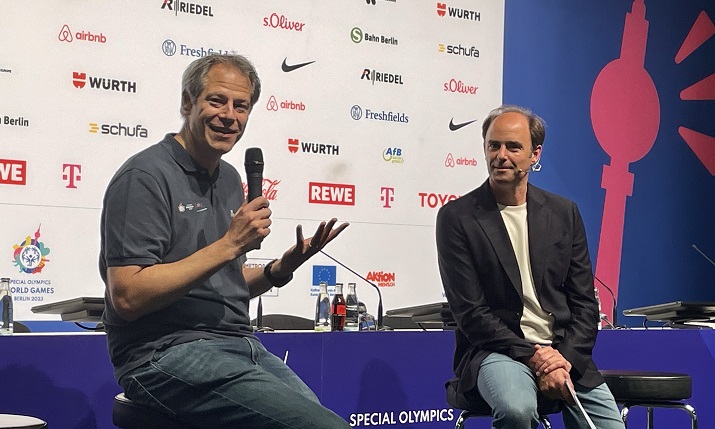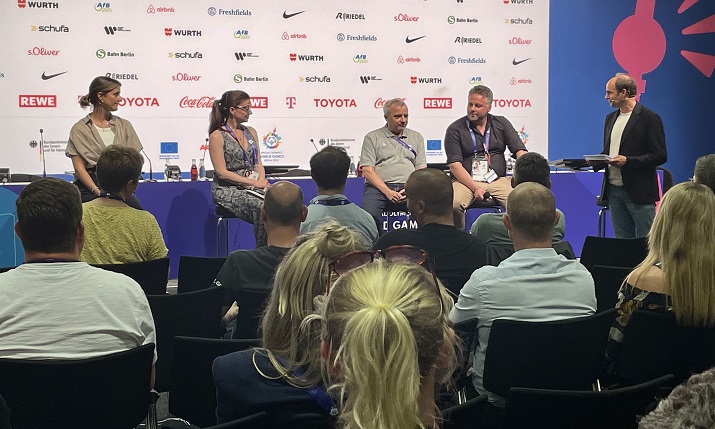Broadcasters gather in Berlin for Sky Sport and SVG Europe DACH Summit

Special Olympics World Games 2023 athletes share their experiences of the Games with DACH Summit attendees
The German, Austrian and Swiss broadcasting and production community gathered for its annual day of panel discussions, presentations, and networking in Berlin on Wednesday this week, with the Special Olympics World Games, sustainability, diversity and the latest technology trends shaping production and distribution all on the agenda.
This year’s DACH Summit, sponsored by Vidi, took place within the media centre at the Special Olympics World Games in Berlin, providing attendees with the chance to take in the Games and watch some of the events before the Summit.
Hosted by Sky Deutschland senior vice president of sports production and SVG Europe chair Alessandro Reitano, the DACH Summit began with an opening keynote from Sven Albrecht, chief executive of the Special Olympics World Games 2023.

Sven Albrecht, chief executive of the Special Olympics World Games 2023
“There has never been something like this and on this scale before, and hopefully after these Games have finished no one will ask again if it’s possible,” said Albrecht.
Addressing the audience, Albrecht added: “Many of you will be from the technical sphere, so maybe you don’t get as emotional about the content, but you contribute significantly to get these results and share these emotions.
“There are athletes form 185 nations here, and it is your work that allows us to share these stories with society as a whole. In 2015 we had a dream, and now we can say this dream has become a reality.”
Then, attendees heard from some of the athletes, who all praised the impact of the Games and implored attendees to make sure they watch an event or medal ceremony to appreciate what the Games really mean to those taking part.
Next up, Charly Classen, EVP Sky Sport Deutschland, joined Reitano on stage to speak about how sport and broadcasters can act as a force for good.
He spoke about the media alliance of 11 of Germany’s largest broadcasters and media firms who are working together to produce and share content about the Games, and how their actions embodied the Games’ tag line of ‘Unbeatable Together’.

Charly Classen with Alessandro Reitano
But he also said that in striving for even greater reach, he was a little critical of some aspects of coverage.
“The benchmark could be higher,” he said. “I read the papers on Sunday, and the coverage of the opening ceremony was fantastic, but I would have liked to see broader coverage of the events that followed as well, so there is still some way to go to get these Games heard and felt.”
Speaking more generally about sustainability, Classen said there had been a change in attitude towards brands and their roles within society.
“We have an obligation to be active. Sport touches people more than anything else, so it’s our obligation to join forces to do more.”
Next, Roman Steuer, consultant, LOC, Zlatan Gavran, MD, NEP Germany, Kate Jackson, VP production, ESPN and Johanna Torchetti, operations manager, Sky Deutschland took to the stage to speak about the production workflows at the Special Olympics World Games.
Read more Live from Special Olympics World Games 2023 with LOC’s Roman Steuer
ESPN has some 70 staff in Berlin, with another 40 based at the firm’s base in Bristol, Connecticut, working on the Games.
The broadcaster has focused on track and field, swimming and powerlifting, with ESPN’s Kate Jackson reporting that the network has “really embraced” the Games.

Left to right: Johanna Torchetti, operations manager, Sky Deutschland, Kate Jackson, VP production, ESPN, Roman Steuer, consultant, LOC, Zlatan Gavran, MD, NEP Germany
She added that ESPN has been broadcasting coverage of the Game since 2015, and that this year’s world feed was the most impressive. She said: “It is the most robust, thorough, and thoughtful plan ever, and we are really lucky to be partners and so happy with what we’ve been able to offer viewers. There has been unprecedented coverage on ESPN, our platforms and across the network. It’s been great.”
NEP, which started work on the Games back in October, has some 310 people on site and is operating 13 trucks and completed the technical fit out of the IBC.
“Here, there is a different focus to other games,” said NEP’s Zlatan Gavran. “Emotions are the focus, which is one of the things we had to take into consideration with camera angles, for example, to capture athlete and spectator reactions.”
Torchetti agreed, and said it was a priority for Sky to capture as much emotion as possible, while Jackson added: “The philosophy of our coverage is to go with a plan, but be open to reacting to things.
“For example, there was a weightlifter who is also a poet who took time to read some of his poetry on ESPN. If you are paying attention, stories are happening all the time, all around you, during events or on the way to venues – there is a embarrassment of riches. I keep saying to my team, this is one of the only events that you will work on where perceptions will change and the world will be different afterwards, and can’t always say that.”
Following a case study from TVU Networks on remote commentary for Bundesliga 2 with Sportcast, Reitano chaired a discussion on the trends that are shaping sports production.

He was joined on stage by Tim Achberger, Sportcast, Mike Ward, Reality Check Systems, Thomas Riedel, Riedel Communications and Christian Holzer, Sportec Solutions (pictured above) for a wide ranging debate that covered the challenges of identifying which technologies and applications are likely to gain traction and which are might fade away.
Having considered broader global trends such as the impact of coronavirus, rising inflation and Russia’s war against Ukraine, technologies such as artificial intelligence were discussed, with Mike Ward commenting that some customers feel that because it’s a buzzword they have to ask for it, but it is important for vendors to ask why they want to use it and be clear on what they are trying to achieve.
Thomas Riedel added that for many it is becoming impossible to manage the rising volumes of video and audio data, and so intelligent assistance is required – assistance that could free up some staff members to fulfil other roles, thus helping to alleviate the skills shortage.
Andreas Heyden, chief executive of German streaming challenger brand Dyn Media was next to share his thoughts with the attendees. With Dyn set to launch 23 August, Reitano asked Heyden about the kind of content that will air on the platform, rights deals and production plans.

Heyden explained that Dyn show 2,400 matches per year, 70% of which it will be host broadcaster and that it is working on building ‘VPUs’ – virtual production units – and working with NEP on its production plans.
Dyn is also working with Deltatre to deliver an end-to-end OTT service, Riedel as connectivity partner and WSC Sports to provide AI-powered content.
“We want an efficient production chain with good partners,” Heyden said.
The German Women’s Bundesliga was the subject of the next panel, with Benjamin Daub, senior manager media rights and broadcasting, DFB, Julia Böttger, director of operations, Sky Deutschland and Michael Bracher, SVP of programming, DAZN sharing their thoughts.
Michael Bracher provided an update on DAZN Rise, a free, ad-supported streaming channel dedicated to women’s sports – including Women’s Bundesliga, plus French and Spanish league football, golf, basketball, handball and documentary content.

Left to right: Benjamin Daub, DFB, Julia Böttger, Sky Deutschland and Michael Bracher, DAZN with Alessandro Reitano asking the questions
“In October, we thought we have so many cool rights how can we make more of them? How can we make them more visible and how can we commercialise that? So, within four and a half months we had created a Fast (free, ad-supported) channel from scratch.
“Women’s sport is such a beautiful growth market -it is growing by 300% a year. If that was from zero, it would not be so impressive, but three years of 300% is very impressive. As Andreas Heyden said about Dyn, we are not doing this purely for humanitarian reasons, but because there is a business case. And that why it is important to work together – with Sky which is producing the games, and DFB which is organising. And then, we hope we are able to gain the same position as men’s football.”
Julia Böttger spoke about Sky Deutschland’s role in producing coverage of the upcoming season. She said: “We were interested in licences for live broadcasting but unfortunately we weren’t successful, but we want to contribute to it and that’s something we can do through our production expertise.”
“We will produce a big portion ourselves with our own vans, and for larger games we will produce with NEP. The stadiums will be connected to fibre and once that is all set up we will see what else we need, but innovation will play an important role.”
For the final session of the afternoon, Klaus Bohm of Shickler Unternehmensberatung spoke about the importance of a robust data strategy, while also setting out future scenarios for the TV and video industry.

